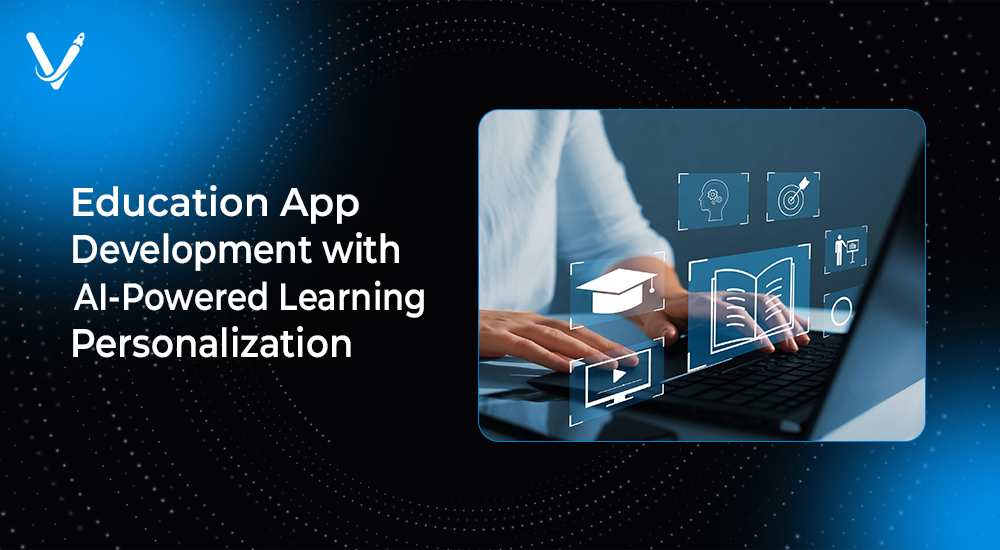Education App Development with AI-Powered Learning Personalization


- Oct 12, 2025



Key Takeaways
The digital revolution in education has shifted traditional classrooms toward hybrid and fully online experiences. Yet, despite the abundance of digital resources, learners still crave the human touch—a guide that understands their strengths, weaknesses, and learning patterns.
This need has sparked the rise of AI-powered learning personalization—a transformative approach in education app development that uses machine intelligence to tailor content, pacing, and feedback for every student.
In this new era, education apps are no longer static repositories of lessons—they’re living, adaptive companions that learn about the learner. The result? More engagement, faster mastery, and measurable outcomes that benefit both students and educators.
This blog explores how AI personalization is revolutionizing education app development, its key technologies, benefits for businesses and institutions, and the strategies to design intelligent, future-ready learning experiences.
For decades, education systems relied on uniform teaching models that treated every student the same way. However, no two learners think alike. One may grasp visual explanations quickly, another may prefer text-based content, and some may need repetition to truly understand complex ideas.
AI-powered personalization brings a new level of inclusivity to learning by recognizing these differences in real time. Instead of offering the same lesson plan to every user, modern apps use AI to analyze learner data—performance, behavior, time spent, and even emotional engagement—to curate individualized pathways.
This evolution reflects a broader shift: education is moving from standardization to customization, enabling learners to progress at their natural rhythm while maintaining motivation.
For founders and investors, this transformation represents a massive opportunity. Edtech products that can adapt to users are not just more effective—they are more engaging, retain users longer, and scale sustainably.
At its core, AI-powered learning personalization refers to integrating artificial intelligence into education systems to tailor every interaction to the learner’s context.
In practice, it means using intelligent algorithms that analyze:
By combining these insights, an AI-enabled app dynamically recommends customized lessons, adaptive tests, and contextual feedback—just like a skilled human tutor would.
The result is a data-driven education experience that aligns with each student’s unique journey while helping educators and administrators track growth, predict outcomes, and intervene strategically.
The explosion of e-learning platforms has made it easier than ever to access knowledge—but harder to keep users engaged. Research shows that personalization increases learner retention and motivation by up to 40%, because students feel more in control of their progress.
Here’s why AI personalization has become a cornerstone of modern education app development:
In short, AI personalization bridges the gap between human empathy and digital scalability, making it indispensable for future-ready edtech platforms.
Building an education app with adaptive intelligence requires a combination of AI subfields and data infrastructure that work seamlessly together.
ML algorithms analyze student interactions to detect learning patterns and predict performance. Over time, they refine lesson delivery and difficulty levels, creating a feedback loop that enhances personalization accuracy.
NLP powers chatbots, voice assistants, and essay evaluation systems that understand and respond to human language. Students can interact with their app conversationally, ask questions, and receive context-aware explanations.
Just as Netflix recommends shows, AI in education suggests next lessons, topics, or practice tests aligned with the learner’s knowledge gaps and interests. These systems are essential for adaptive course sequencing.
By analyzing historical data, predictive algorithms anticipate student dropouts, difficulties, or performance issues—allowing educators to intervene early and improve retention.
In live online sessions, computer vision detects facial expressions and engagement levels. AI then adjusts teaching speed or delivers nudges if attention drops, enhancing interactivity.
These structures map relationships between topics, enabling AI to suggest content that builds on existing knowledge progressively. This creates coherent, structured learning journeys.
Together, these technologies create hyper-personalized educational ecosystems where every click, pause, or question contributes to a deeper understanding of the learner’s needs.
AI doesn’t just automate processes—it humanizes digital learning. By replicating aspects of emotional intelligence and adaptability, it brings a new dimension to online education.
Instead of a fixed syllabus, AI dynamically adjusts difficulty and content sequencing. A student struggling with algebra receives simplified problems before advancing, while another excelling moves directly to higher-level topics.
Traditional grading delays progress. AI enables instant assessment and feedback, explaining why an answer was wrong and suggesting additional resources to fill knowledge gaps.
AI chatbots act as 24/7 tutors that guide learners through challenges, answer queries, and provide motivation. They scale human support without additional instructor load.
AI tracks engagement metrics and triggers gamification elements—badges, streaks, or challenges—when users show signs of fatigue or disinterest, sustaining motivation.
Through sentiment and behavioral analytics, the system recognizes frustration, boredom, or excitement, adjusting tone and pace accordingly—mimicking a teacher’s empathy.
AI personalization continues beyond classrooms. Learners receive career-oriented recommendations, upskilling paths, and real-time skill-gap insights, fostering continuous growth.
AI-powered personalization transforms education into a win-win scenario for all stakeholders.
For Institutions:
It enhances student satisfaction, retention, and learning outcomes while reducing operational costs. Administrators gain real-time analytics on engagement and performance to refine curriculum design.
For Educators:
AI automates repetitive grading and progress tracking, freeing teachers to focus on mentorship and creativity. They receive actionable insights to customize instruction strategies.
For Learners:
Every learner enjoys a self-paced journey, adaptive challenges, and contextual feedback. They feel supported, valued, and more confident in mastering complex subjects.
When these elements converge, the education ecosystem becomes inclusive, data-empowered, and outcome-oriented—a true manifestation of personalized learning at scale.
Building such a system requires blending technology with empathy. Let’s explore the essential phases that define AI-driven education app development.
The foundation lies in understanding the platform’s purpose—K-12 learning, corporate training, competitive exams, or professional upskilling. Each use case dictates different personalization logic and AI model behavior.
AI thrives on clean, structured data. Developers must design secure pipelines for collecting learning activity, test scores, behavioral metrics, and content metadata. Ethical data handling is crucial to maintain user trust.
Machine learning models are trained to predict learner needs, adjust difficulty levels, and recommend resources. NLP-based assistants and analytics dashboards integrate into backend workflows to create a holistic experience.
Personalization is only effective if it feels natural. Dynamic dashboards, adaptive progress bars, and intuitive navigation enhance usability. AI should remain invisible yet impactful.
Incorporating AI-driven motivation—like adaptive quizzes, real-time leaderboards, or personalized milestones—keeps learners emotionally connected to their journey.
Unlike traditional apps, AI-powered platforms improve post-launch. Feedback loops ensure that every learner interaction refines algorithmic accuracy, driving sustained improvement.
This blueprint demonstrates how AI personalization isn’t a feature—it’s an evolving ecosystem built to scale and adapt with user behavior.
The global AI in Education market is projected to exceed $25 billion by 2030, fueled by demand for adaptive learning and automation. For founders and investors, this means vast potential for innovation and growth.
AI-personalized apps differentiate themselves through tangible impact—measurable learning improvements, reduced dropout rates, and enhanced satisfaction. Early adopters build strong brand credibility in the edtech ecosystem.
Scalability and data-driven ROI make AI-infused education apps particularly attractive to investors. Predictive analytics ensures consistent growth through user retention and engagement forecasting.
Despite its potential, AI personalization comes with challenges that require strategic foresight.
Collecting sensitive learner data mandates strong encryption, anonymization, and regulatory compliance (GDPR, FERPA). Transparent policies build trust and prevent misuse.
AI models can inherit bias from training data, leading to unequal recommendations. Regular audits and diverse datasets ensure fairness across demographics.
Developing robust AI infrastructure can be expensive initially. Cloud-based AI services and modular integration mitigate costs for startups.
While automation is valuable, the human element remains vital. AI should assist educators, not replace them—preserving empathy and mentorship in learning environments.
As governments adopt AI ethics frameworks, edtech companies must adapt to maintain compliance while innovating responsibly.
By addressing these challenges, organizations can implement responsible AI frameworks that balance innovation with accountability.
The future of education lies in continuous, intelligent adaptation. AI will soon enable hyper-personalized experiences beyond current imagination.
These innovations signify a future where education apps evolve alongside learners—intuitive, inclusive, and intelligent.
Educational institutions worldwide are already witnessing tangible results. Universities use AI to forecast student performance and design remedial modules. K-12 platforms deliver adaptive assessments that help teachers personalize homework instantly.
Corporate training programs leverage AI to track skill gaps and recommend micro-learning content that boosts productivity. The results consistently show improved outcomes, reduced costs, and higher learner satisfaction.
For founders and investors, this validation underscores one truth: AI personalization is not an experiment—it’s the new standard for competitive success in edtech.
Education is no longer about content delivery—it’s about connection, context, and continuous growth. AI-powered personalization represents the next quantum leap, blending human-like empathy with machine precision.
By integrating smart algorithms into education app development, businesses can empower millions of learners to achieve more effectively, while educators gain real-time visibility into progress and performance.
At Vasundhara Infotech, we specialize in developing intelligent education solutions that merge data science, design, and pedagogy into seamless learning ecosystems. Our AI-powered apps personalize every learner’s journey, making education not just accessible but deeply engaging and outcome-driven.
Ready to create the next generation of personalized learning platforms?
Partner with us and redefine how the world learns through smart, adaptive technology.
Copyright © 2026 Vasundhara Infotech. All Rights Reserved.